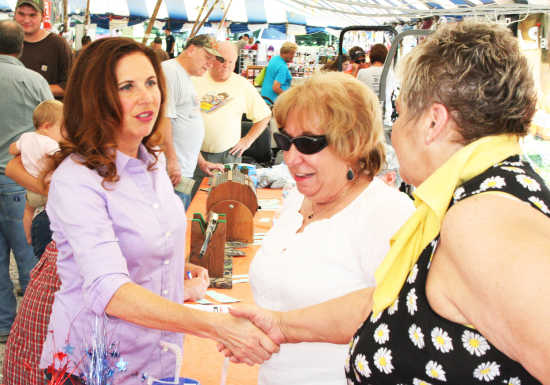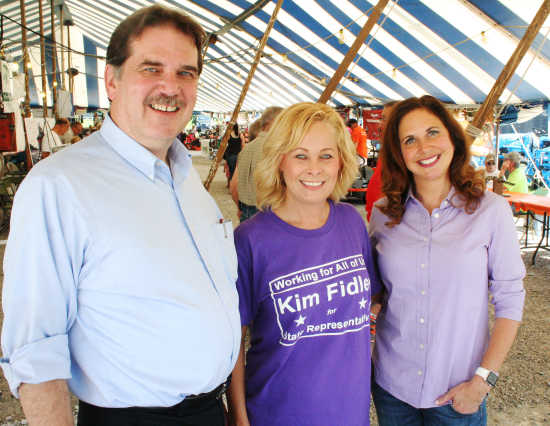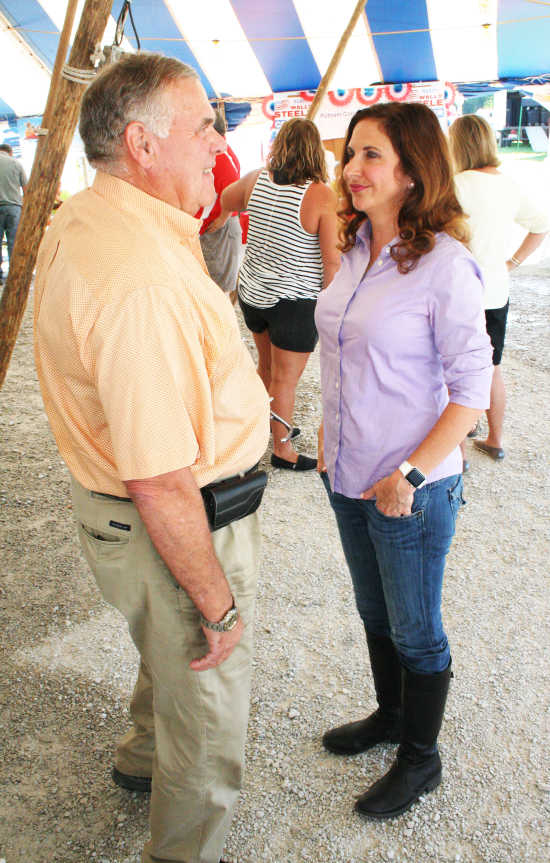Hale embraces bipartisan role for lieutenant governor

Calling herself "a collaborator" who embraces bipartisan support, Democratic candidate for Indiana lieutenant governor Christina Hale visited the Putnam County Fair Tuesday night.
And it didn't take long for Hale, the Indiana District 87 state representative from the north side of Indianapolis, to make good on her promise to continue to "work across the aisle" for the good of Hoosiers and the state.
While talking with Greencastle Mayor Bill Dory and District 44 state representative candidate Kim Fidler of Greencastle, Hale spied incumbent District 44 State Rep. Jim Baird (R-Greencastle) across the width of the industrial tent and immediately crossed the gravel divide to chat him up.
Only moments earlier the 44-year-old Hale was telling the Banner Graphic that she emerged as Democrat gubernatorial candidate John Gregg's pick for his running mate because she has "become known for working across the aisle."
"There are no Republican and no Democrat or independent ideas," she said. "Just good ideas and bad ideas."
It was important to Gregg, she said, to "select someone who is a collaborator."
Hale was making her first campaign appearance in Putnam County on the very day that Eric Holcomb, the Republican lieutenant governor candidate, was selected to be the GOP's 2016 gubernatorial candidate in the wake of Mike Pence's selection as Donald Trump's vice presidential candidate.

"I've been doing farms and fairs all day," said Hale, appropriately dressed in jeans and boots to help fit the part of the lieutenant governor who also doubles as the state commissioner of agriculture.
"This is an exciting time to be running for office," she beamed. "It's historic. Nobody anticipated all these changes."
The Indiana game of musical political chairs has seen Democrat Baron Hill get out and Evan Bayh come back in the race for U.S. Senate. While Pence dropped his run for re-election and the GOP tabbed Holcomb, other Republicans like Todd Rokita and Susan Brooks left their re-election bids (probably only temporarily) to seek the Hoosier governor's spot on the Nov. 8 ballot.
"I'm the only one without an opponent," Hale smiled broadly before reporting that she expects the Republicans to take care of that void soon since a lieutenant governor debate is scheduled for Aug. 9 at the Indiana State Fair.
Asked if this was her first visit to Greencastle, Hale -- born and raised in Michigan City -- said no, she has been to the DePauw University campus previously.
So, it was her first visit here as a political figure, it was suggested.
"A political figure?" she grimaced. "I really don't think of myself as that."
As the great collaborator, Hale plans to take the lead on water issues for the Gregg Administration if the Democrats take the governor's mansion.
While Indiana's overall infrastructure -- think crumbling roads with one-third of Hoosier bridges declared structurally deficient -- is certainly important to the campaign, it is the underground infrastructure that is "out of sight and out of mind all too often" that has captured Hale's attention.

In fact, she says Indiana has at least "$14 billion in unfunded water infrastructure needs," including the prevalence of "100-year-old wooden water pipes."
Yet Indiana has no strategic plan for water, she said, citing a need not just for quantity but quality.
The essential need for clean drinking water, she stressed, is a "lesson learned from Flint, Michigan."
"If people could see the sad state of our water infrastructure underground, they'd be marching on the statehouse," Hale said, adding that water will be one of the prime economic development issues "of the next 100 years."
Economic development is also important to the Gregg-Hale campaign and for community development across Indiana, she said.
"That's kind of where all this comes together," she said. "We have so many needs throughout the state. We have to be more thorough and strategic in our planning."
